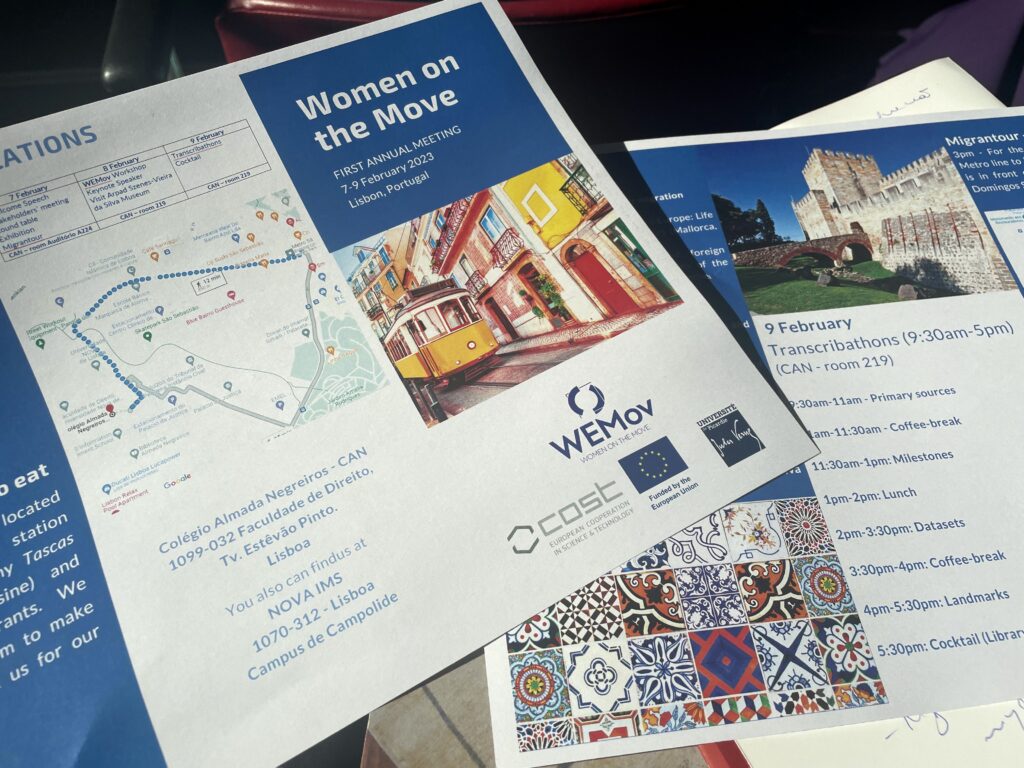
We couldn’t have wished for a better start for 2023. WEMov’s annual meeting just took place in Lisbon, the sunniest capital city in mainland Europe… they say! From February 7th to 9th, we had the chance to meet and work again together, in the capital city of Portugal. The meeting was held at the Colégio Almada Negreiros, known for many years as Colégio dos Jesuítas, that was gradually built at the beginning of the second half of the 19th century. It is today the seat of the Faculty of Social and Human Sciences, Nova University of Lisbon (Nova FCHS).
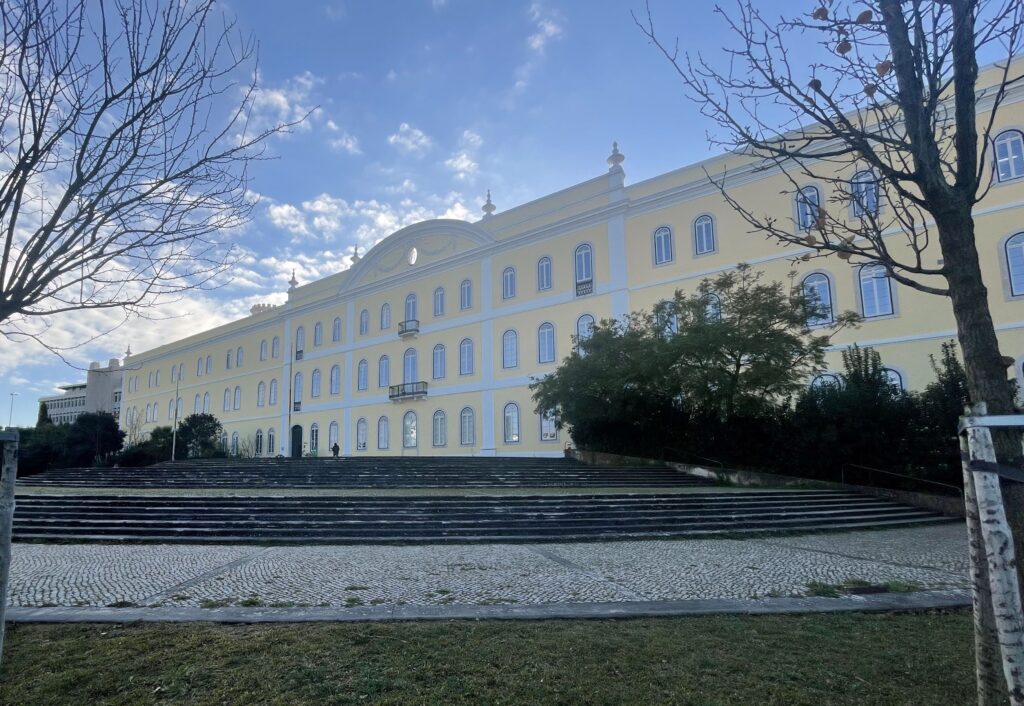
(Colégio Almada Negreiros)
Our meeting started with the welcome speeches, on Tuesday 7 February at 9:30am, the sun was already high. Firstly, as Deputy Director for Internalisation, Culture and Regional Partnerships (Nova FCSH), Maria Cardeira da Silva emphasized how important it is to acknowledge that women still constitute a minority, even though “the word ‘minority’ evokes numbers and people are not numbers!”. Her speech was followed by that of Inês Lourenço from the Centre for Research in Anthropology (CRIA), who took the opportunity to thank the speakers, participants and the possibility to host this event as local organiser
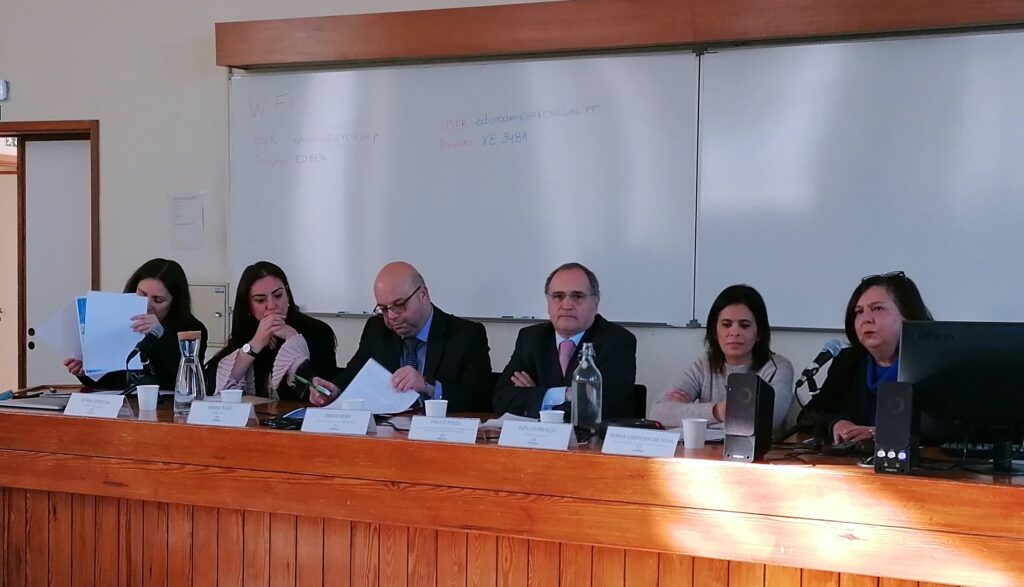
(From right to left: Maria Cardeira da Silva, Inês Lourenço, Paulo Pisco, David Kerr, Marie Ruiz and Sónia Ferreira)
Paulo Pisco, who is Chair of the Sub-Committee on Diasporas and Integration at the Parliamentary Assembly of the Council of Europe then took the floor. He highlighted how difficult it is to tackle all dimensions of the phenomena connected with migration and specifically women’s migration, mostly because of its “invisibility”. But also, the role of “mapping diasporas, in particular the gender aspect, in order to improve policies effectiveness towards integration”.
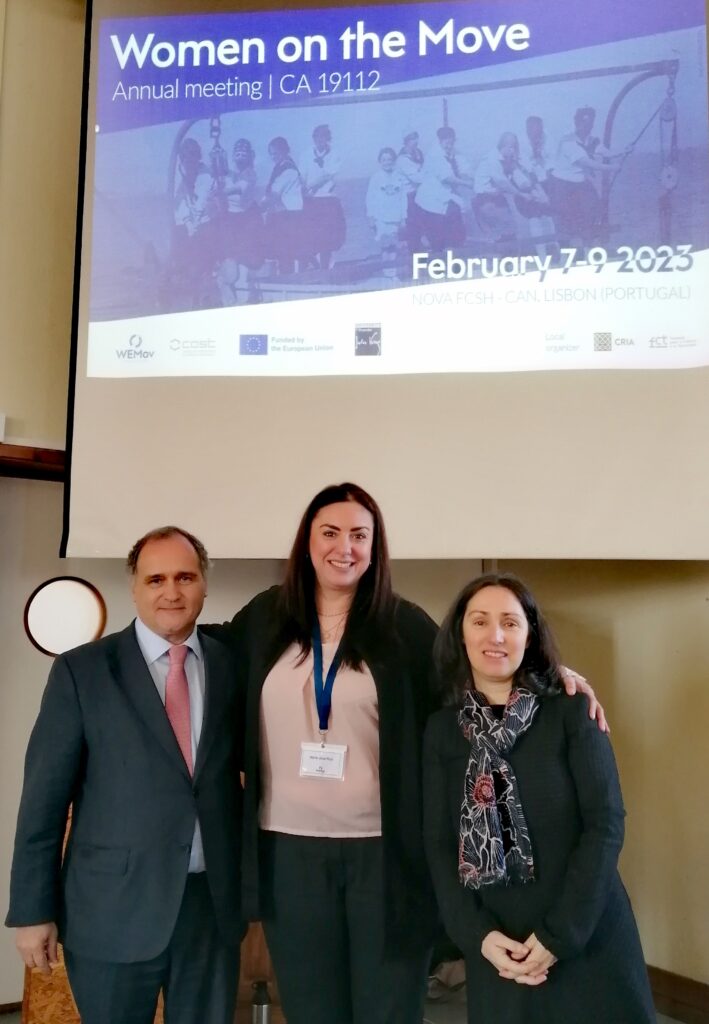
(From right to left: Pisco, Marie Ruiz and Sónia Ferreira)
David Kerr, Cabinet Member from EU Commissioner for Equality Helena Dalli, then took the floor to emphasize the importance of academic research to shape policies, and he also informed us on the many policies being introduced by the EU to facilitate sex equality, and women migrants’ integration. He warmly thanked us for our work on such a timely topic. It was also mentioned how research on gender and mobility can and must cross agendas in order to inform and improve the decision-making process, namely among European institutions.
Then, we had the pleasure to listen to the Chair of WEMov, Marie Ruiz and the network’s Vice-chair and host of this meeting, Sónia Ferreira. They highlighted again (and it is never enough) the importance and the main objective of our network: to display the role women play(ed) in the construction of Europe.
Most importantly, the annual meeting was dedicated to our colleagues from Ukraine, Igor Lyman and Victoria Konstantinova, who were temporarily allowed to cross the Ukrainian border to attend our annual meeting. A long and emotional round of applause was given to the colleagues we hadn’t seen since our Budapest meeting.
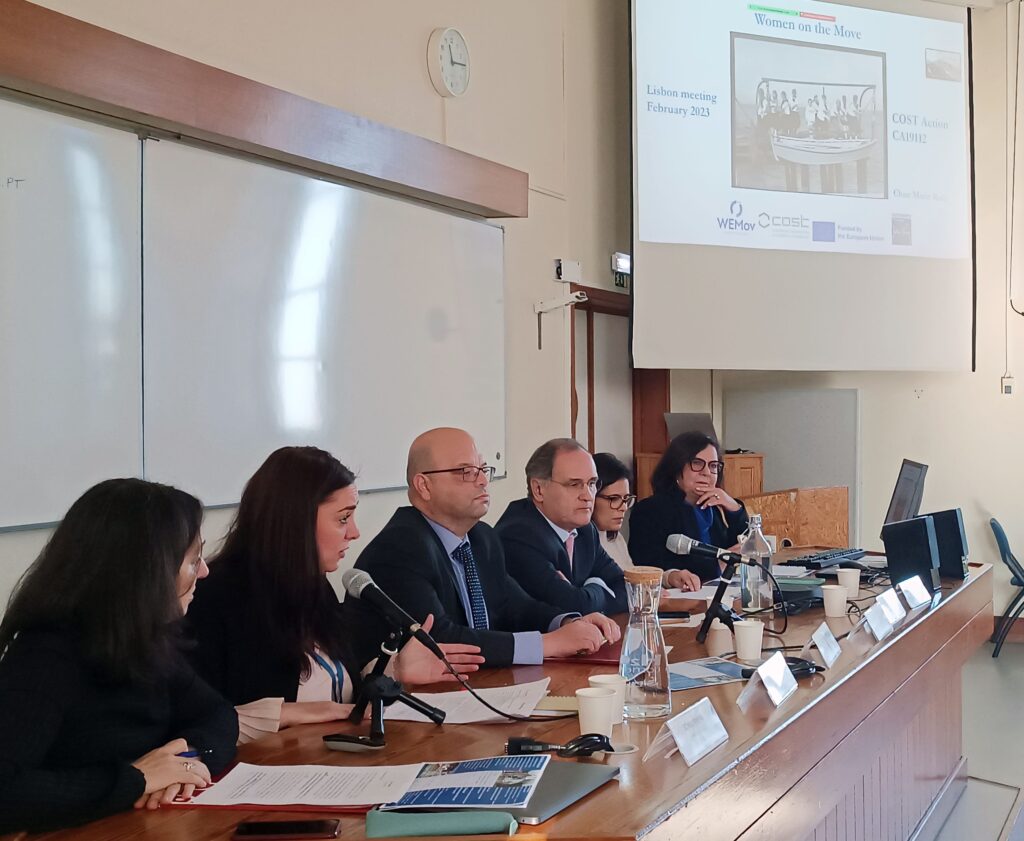
(Kick-off of the WEMov annual meeting)
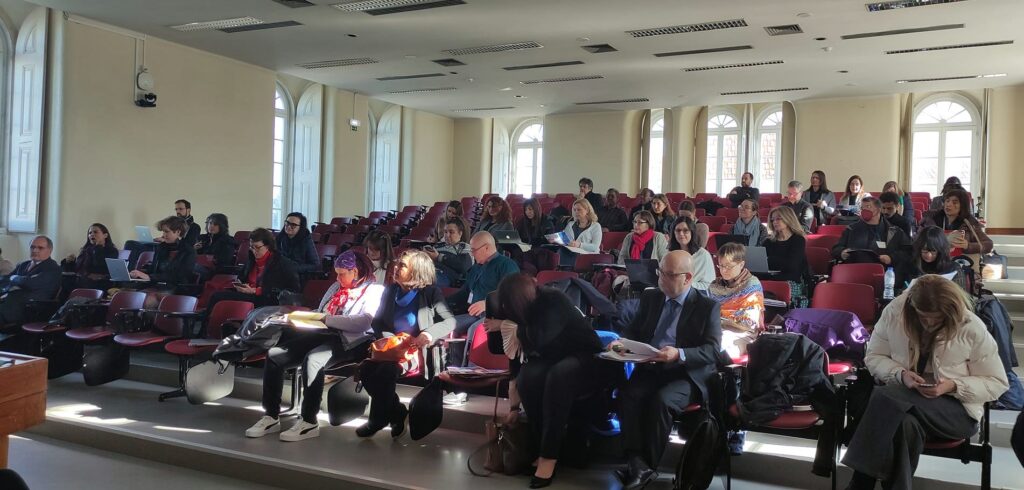
(Audience, WEMov members)
Right now, we can count 52 countries represented in our Cost Action. It means more than one quarter of the overall existing countries in the entire world.
The work was pursued with the presentation from Local Institutional Stakeholders. Women on the Move’s stakeholders include a variety of partners who support our timely mission. Each in-person meeting represents an opportunity to meet and exchange with existing partners or get to know and engage with new ones.
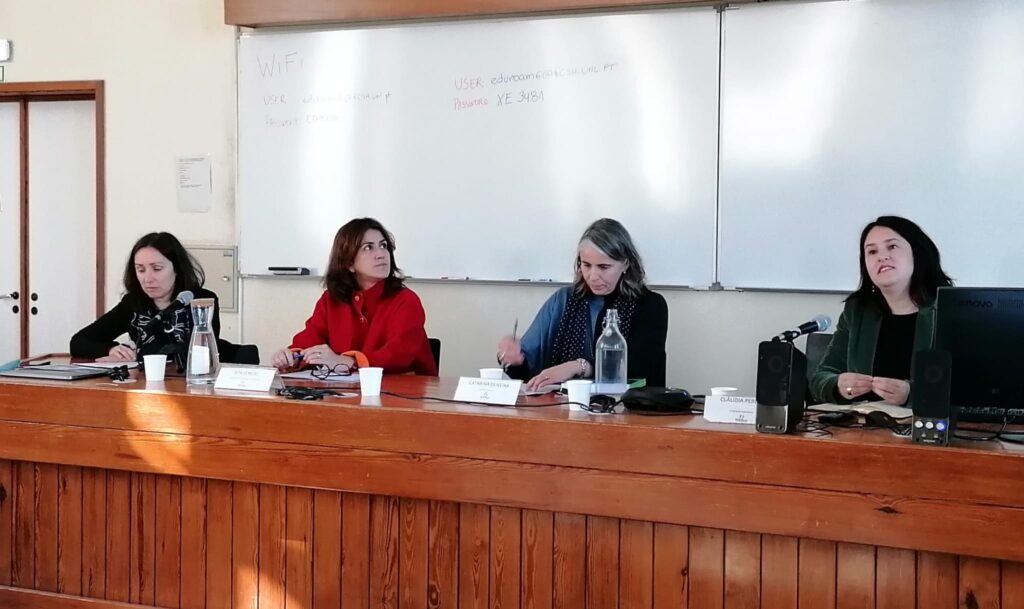
(From right to left: Cláudia Pereira, Catarina Oliveira, Rita Penedo and Sónia Ferreira)
The first two presentations were done by Cláudia Pereira, from the Emigration Observatory. The Emigration Observatory (OEm) is an independent technical and research structure integrated in the Centre for Research and Studies in Sociology (CIES) of Iscte, University Institute of Lisbon, where its headquarters are located. The Observatory (created in January 2009) has three main goals: collect, harmonize and analyse information on the evolution and characteristics of Portuguese emigration and Portuguese emigrated population; disseminate all the compiled information, promote the discussion with the general public; and contribute for the definition and evaluation of public emigration policies based on information and knowledge about this domain of intervention.
The presentations continued with Catarina Oliveira from the Migration Observatory (created in 2002). As she started by explaining: they work closely with the Emigration Observatory. The Migration Observatory (OM) is a project team whose mission is the study and strategic and scientific monitoring of migration and collecting, analyzing and disseminating statistical information about migration. Catarina Oliveira reminded us: “To know more as to act better”! She also pointed out how it’s always a question of perspective. Indeed, while some media and political discourses on migration exaggerate the impact of immigrants arriving in Portugal, the numbers show a different reality: the officially registered immigrants make up only 7% of the total population. Of course, the numbers presented are limited, but it allows the public to understand how immigrants are not dangerous, as some ideological strands suggest and defend!
Rita Penedo, from the Observatory on Trafficking in Human Beings, was the last presenter of this panel. The Observatory (established in 2008) is part of the Ministry of Home Affairs and develops its work in close cooperation with the National Coordinator. The mission of the Observatory is to produce, collect, analyze and disseminate information and knowledge about trafficking in human beings and other forms of gender violence.
After engaging in a fascinating discussion, it was time for a coffee break. We were all looking for the Pastéis de Belém! The most famous Conventual sweets in Portugal and abroad. Created in Jerónimos Monastery, with the dissolution of religious orders, the pastries started to be sold outside the Monastery, becoming known as Pastéis de Belém.

(Maria de Lurdes Monteiro, from the Association of Cape Verdean Women in the Diaspora)
At 11 am started the Local NGOs’ presentations with the presentation of Maria de Lurdes Monteiro, online recording, directly from Cape Verde, presenting the Association of Cape Verdean Women in the Diaspora (created in 2011). Danielson Tavares did the second presentation from the same Association. He addressed all his respect to women migrants, saying that “the work of our is mainly dedicated to the elderly women becoming the flag of our country and traditions, preserving the history otherwise lost in the process of migration”. It is one of their primary concerns: somehow to “find a way to repay all the invisible work of these women, all the energy and love they spend raising their children, taking care of their family, cleaning, all this invisible work that is essential to keep a country running and also, despite the fact that they have lower levels of educations, to value their knowledge and experience”. They also encourage younger people to help elderly people get familiarized with new technologies, improving intergenerational relationships.

(From right to left: Danielson Tavares, Fatinha Veracruz and Sónia Ferreira)
Last but not least, Fatinha Veracruz presented the Men Non Association of Santomean Women in Portugal (established in 2010). “Mén Non” means “my mother”, and it is an association that promotes equality, participation and non-discrimination. Fatinha Veracruz explained that three main reasons could be identified that justify the displacement of women from São Tomé and Princípe to Portugal: 1) family reunification; 2) for health reasons, for themselves or close family members; 3) schooling/education. This association intends to reinforce the citizenship of women and, in particular, of migrant women, acting in different spheres: housing, economic aid, empowerment through training and employment, medical and psychological support, conferences on various topics, cultural events, etc.
From 11:30 am on, David Kerr from the Cabinet of Commissioner for Equality Helena Dalli gave us the honour of chairing the ensuing round table with all local stakeholders and guests, which led to fascinating discussions about women migrants, gender equality and inclusion at Portuguese and EU level.
After an intense morning of work, nothing better than reaching lunchtime! Some of us decided to have lunch at the canteen inside the building, which was very practical and enjoyable. Others went to catch some Lisbon sunlight. After lunch, we were on time at 2pm for the opening of the Exhibition in the Library Hall of the Colégio Almada Negreiros. The Women on the Move posters were exhibited in such a beautiful setting!
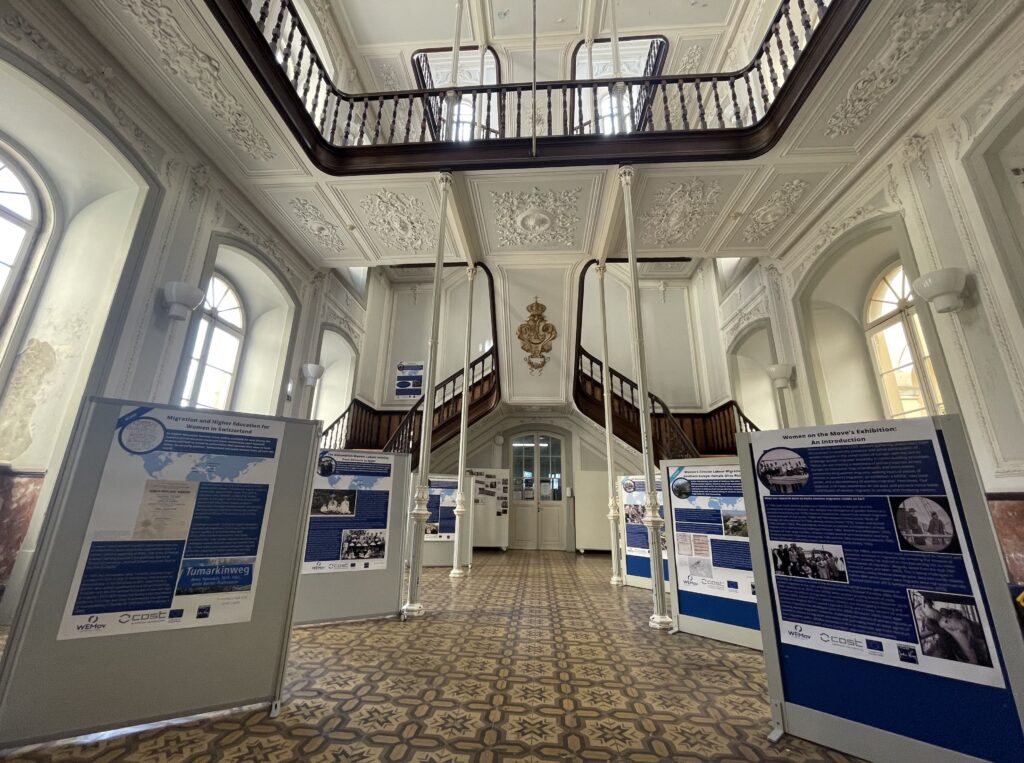
(Women on the Move Exhibition at the Library Hall of the Colégio Almada Negreiros, Lisbon)
The hall of the library “Vitorino Magalhães Godinho” of the Colégio Almada Negreiros was the place chosen to present our exhibition. In the space where the Jesuits’ library was installed, there is now the main hall of the Almada Negreiros College (Faculty of Societies and Human Sciences, New University of Lisbon). Despite being stripped of the books and shelves that covered the lower floor and the gallery, the old library still maintains some decorative elements that date back to the Jesuit period.
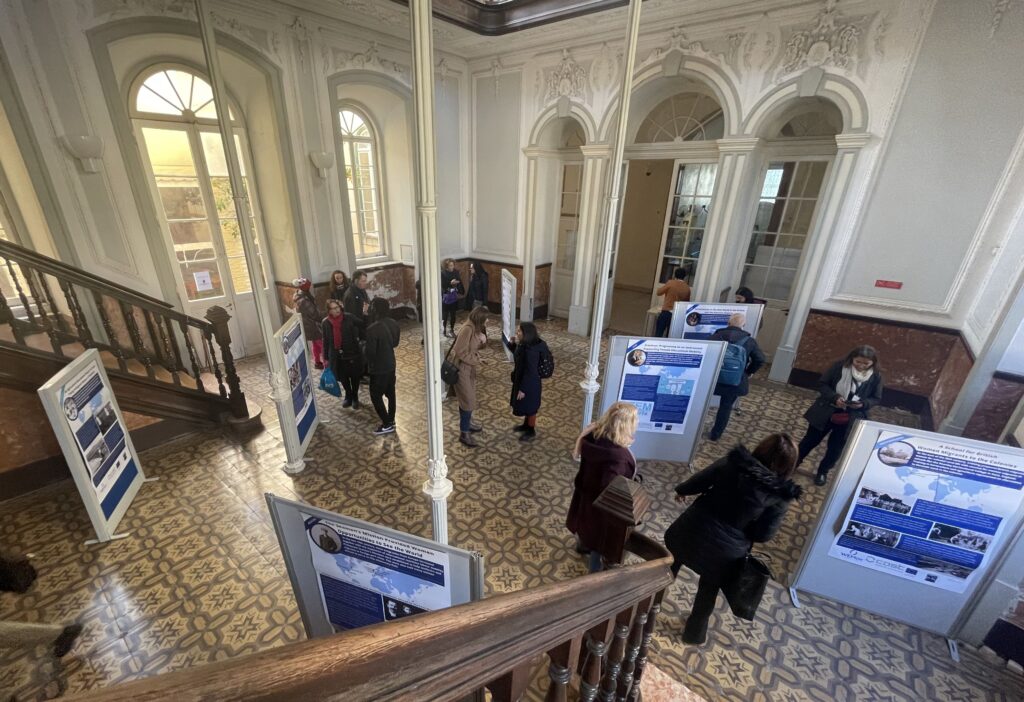
(Women on the Move Exhibition at the Library Hall of the Colégio Almada Negreiros, Lisbon)
At 3:30 pm, we started our Migrantour! “Mouraria, in particular, is now known as the most multicultural and liveliest neighborhood in Lisbon, where more than 30% of its inhabitants are migrants, with 50 nationalities living together. In this district you can see the legacy of the fado and the importance of the river, but also listen to a new language, dance to the sound of new music and let the senses travel far. Renovar a Mouraria was the first Association to conduct guided tours in what seemed to be a forgotten neighbourhood. Showing to the visitors that the Mouraria is filled by human and historical wealth was the main concern of the Association. It all started in 2008 along with the City Council and local organizations, and everything has developed since then” (from the website).
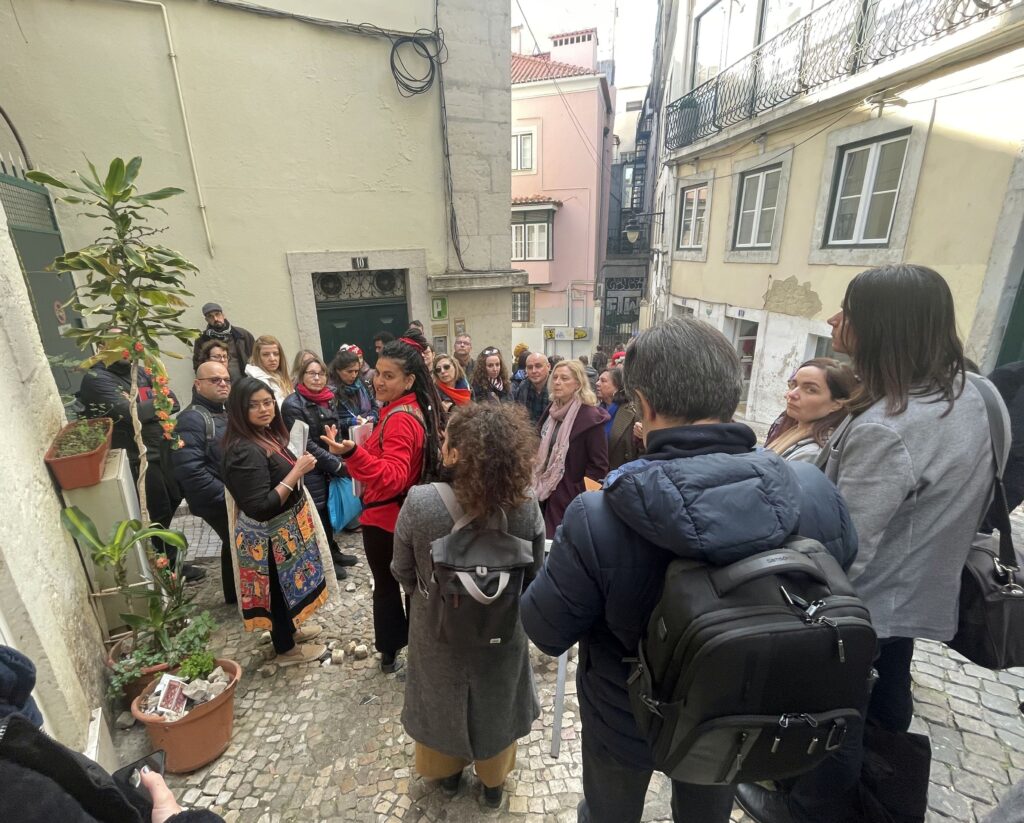
(Migrantour around Lisbon)
We were so lucky to enjoy the tour thanks to our guides Monisha from Bangladesh and Vanessa from Chile, together with the coordinator of the Association Renovar a Mouraria, Carla Costa. Walking the streets of Lisbon, through the experiences, feelings and life stories of Monisha and Vanessa, made us questioning the legitimacy and shared authority much needed in order to create and promoting walking-tours ethically worthy, taking into account that space is socially constructed, belong and can (should!) be (re)appropriated freely by its residents – people actually living in such places. We will recall the objects, pictures and stories told by our guides, and also recall Monisha singing songs from her homeland, right there at the musical hearth of Portugal, the Casa da Severa, the first Fado singer. Different universes communicate and interconnect, enriching all of us. What an experience!
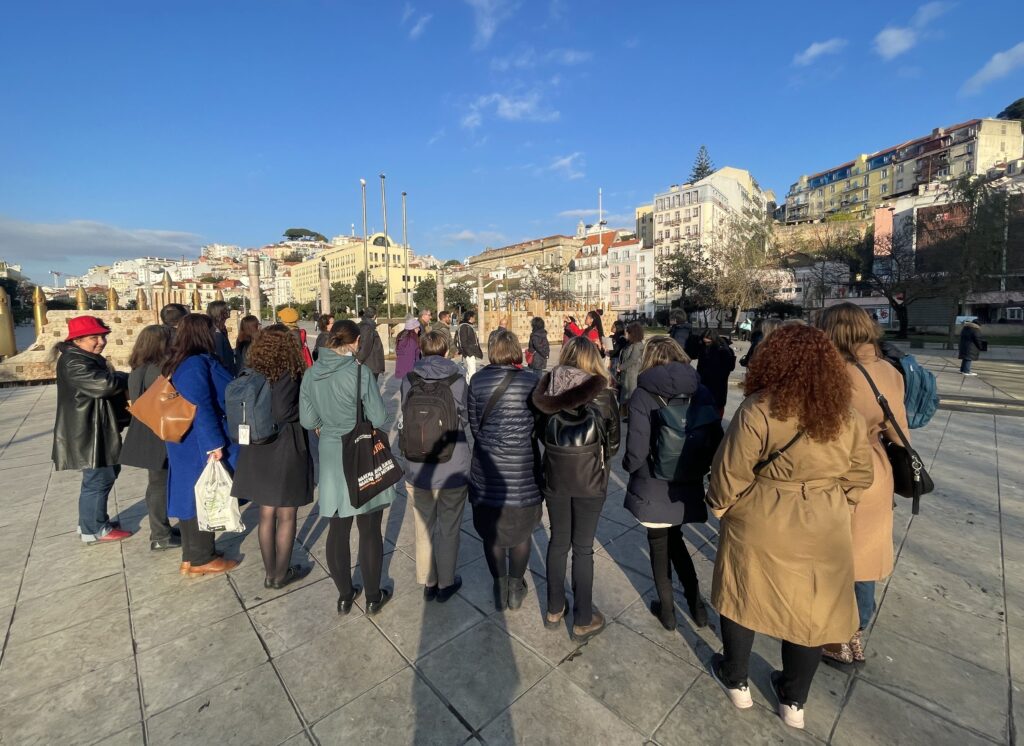
(Migrantour around Lisbon)
Another very special place, in Mouraria, was the Praça Martim Moniz. Our guides explained to us how this place is now appropriated by the residents, hundreds of Muslims usually gathered to celebrate Eid al-Fitr, the festivity that ends a month of fasting, the end of Ramadan.
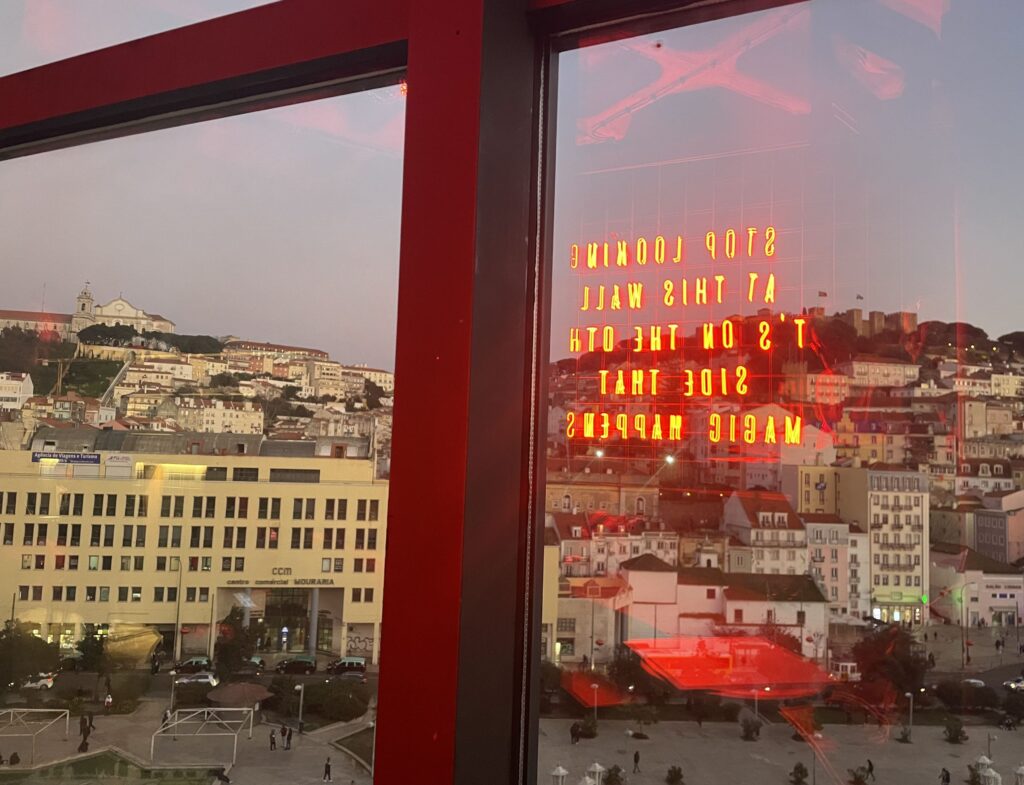
(From inside Topo, Martim Moniz, rooftop bar in Lisbon)
Before the dinner planned for 8pm, we had time to enjoy an amazing rooftop and have an aerial view of the Praça Martim Moniz from upstairs.
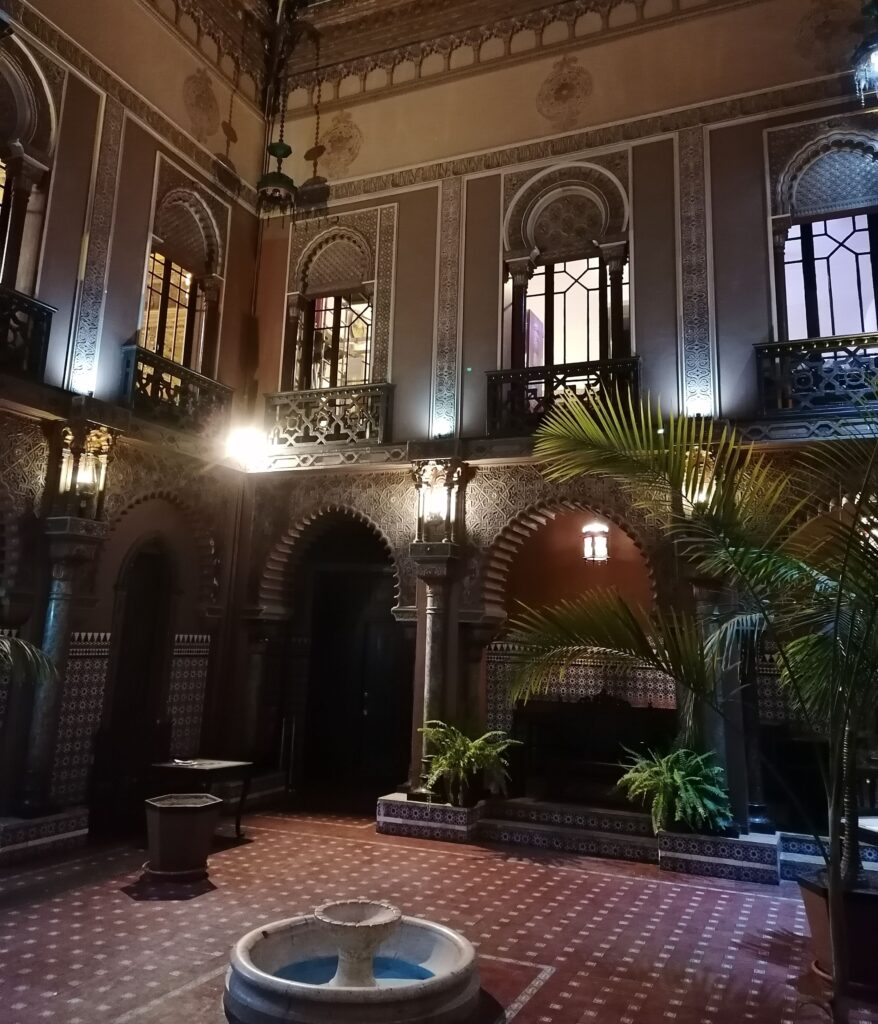
(The entrance hall of Casa do Alentejo)
The conference dinner took place at the Casa do Alentejo, a hidden place in the centre of Lisbon. With banal external appearance, but surprising inside. Moorish decor and Moroccan style, the Casa do Alentejo, dating from the end of the 19th century, is an unusual place in Lisbon. A sumptuous, ornate staircase led us to the old lounges with walls decorated with azulejos. We had dinner in one of these lounges, which then awaited us with an unforgettable dinner. For dessert, most of us had the chance to try one of the typical desserts from Alentejo, the Sericaia!
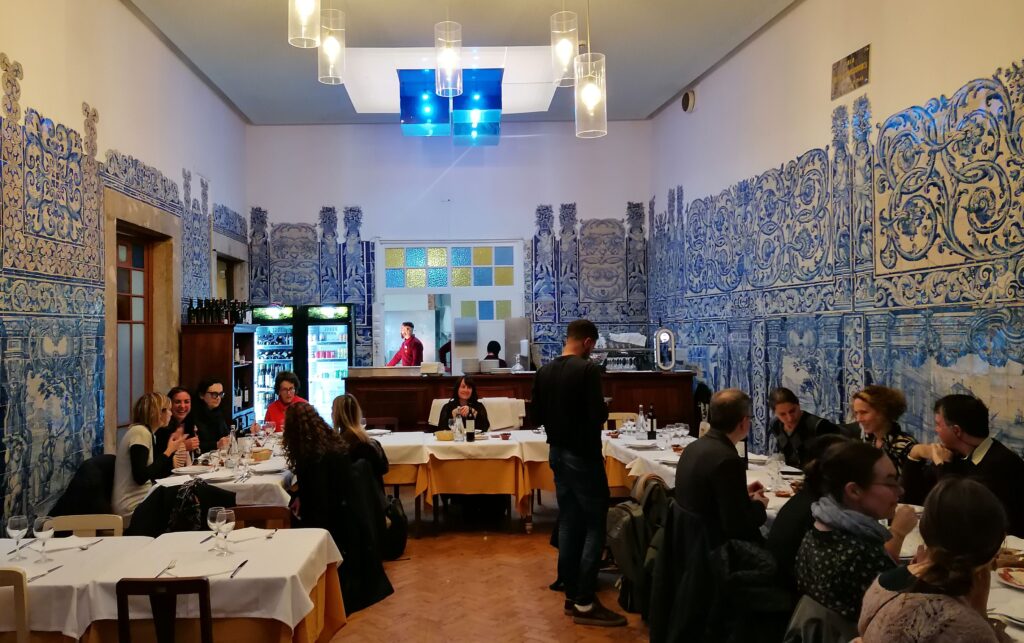
(Dinner at the Casa do Alentejo)
The second day of the WEMov Annual Meeting, started with a wonderful, insightful keynote via zoom by Parvati Raghuram (Open University) entitled “Thinking place in researching migrant women”. She spoke about the importance of place as social and multidimensionally constructed, from and in which feelings of belonging are co-(re)created. She started by presenting « place » within migration theories, then elaborated on how « place » matters: 1) migration as topic; 2) migration as analytical; 3) migration as voice.

(Keynote speaker, Parvati Raghuram, from the Open University)
Whilst she mentioned that for migrants a place can be constructed as ‘simultaneously inhabited’ as migrants coexist in two spaces, migration itself can make place. The main being “undoing place as location, moving towards place as locale”. Finally, she highlighted the importance of going beyond perceiving the importance of female migrants’ social reproductive roles and focus on the realities of contemporary female migrants who are taking on roles as innovative entrepreneurs, serving niche markets by helping other female migrants, teaching and acting as cultural translators.
After the presentation, we had discussed directly with Parvati Raghuram in a very fruitful discussion, followed by the coffee break.
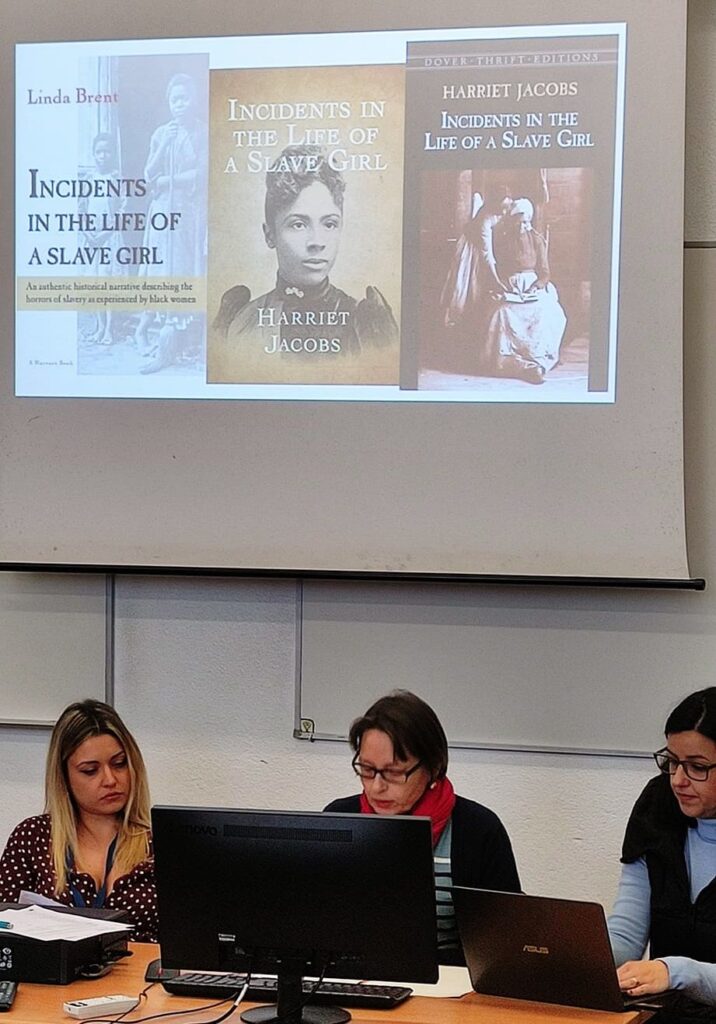
(From right to left: Joana Topa, Sirpa Salenius and Stellamarina Donato)
The meeting then continued with the panel on Women migrant’s activism, chaired by Joana Topa. The first presentation entitled « Nineteenth-century Black Women’s Agency and Campaings Against Slavery » by Sirpa Salenius, led us to the story of Harriet Jacobs, Ellen Craft and Sarah Parker Remond, three fearless women not afraid to address taboos such as sexual exploitation, having public talks and travelling. A truly inspirational presentation. The second presentation, entitled « Women returnees in post-revolutionary contexts » by Stellamarina Donato, identified a gap in migration research, on the specific topic of women migration return and presented the ways in which she will address it.
After the open discussion, time for a well-deserved coffee break!
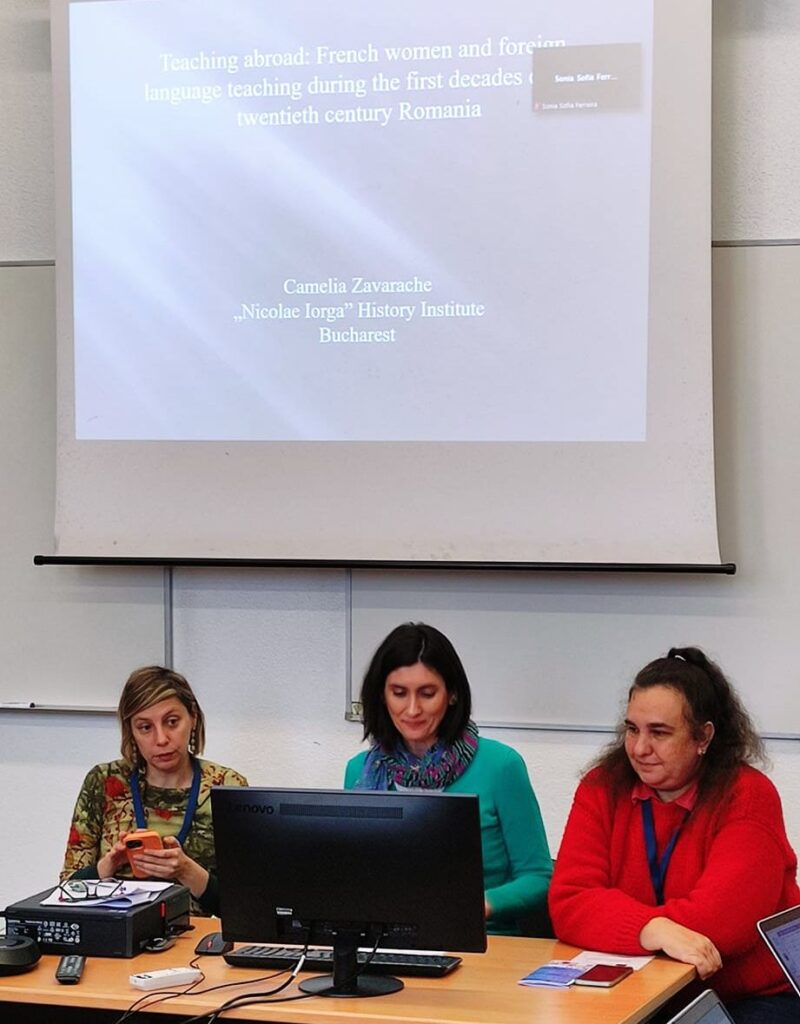
(From right to left: Maria Bostenaru, Camelia Zavarache and Joana Pujades)
The second panel was on Women’s labour migration, chaired by Maria Bostenaru. The first presentation, by Joana Pujades, was entitled « Women’s circular migration in Southern Europe: Life course and wages of female olive pickers (Mallorca, 1645-1696) ». The second presentation, by Camelia Zavarache was entitled « The national and cultural role of kindergarten teachers in South Dobruja 1913-1940 ». Both presentations focused on the women’s agency, on their personal agency to move.
Time to gather together for lunch at the canteen of the Colégio Almada Negreiros. A very pleasant time during which we get to connect to each other and exchange around work topics as well as personal experiences.

(From right to left: Paolo Ruspini, Biljana Ristovska-Josifovska and Elaine Moriarty)
The afternoon panel, on Female migration: networks and narratives, was chaired by Biljana Ristovska-Josifovska. The first presentation entitled “Girls worth saving: The discursive Construction of girls during migrant crisis events across history”, by Elaine Moriarty was followed by the presentation Paolo Ruspini on “Social Capital and Female Migrants”.
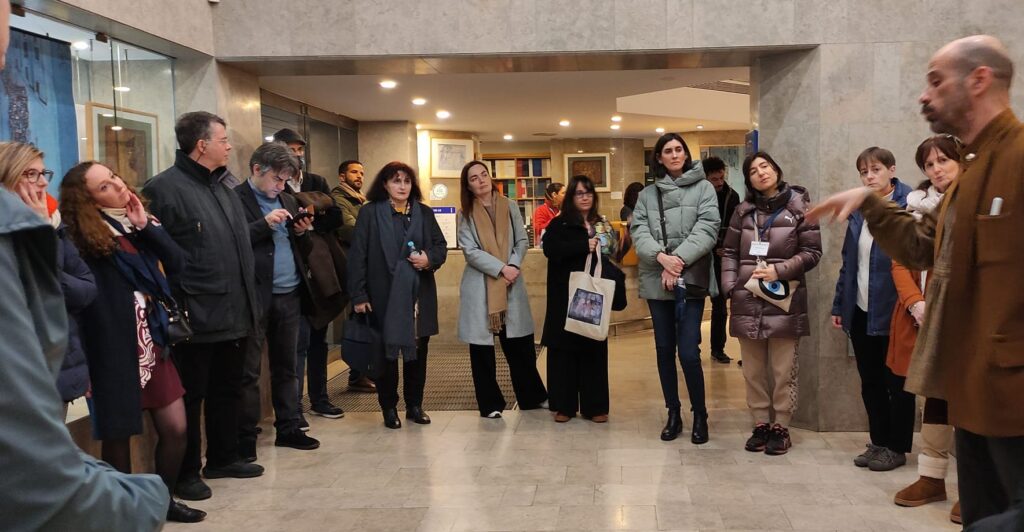
(Visit of Arpad Szenes – Vieira da Silva Museum)
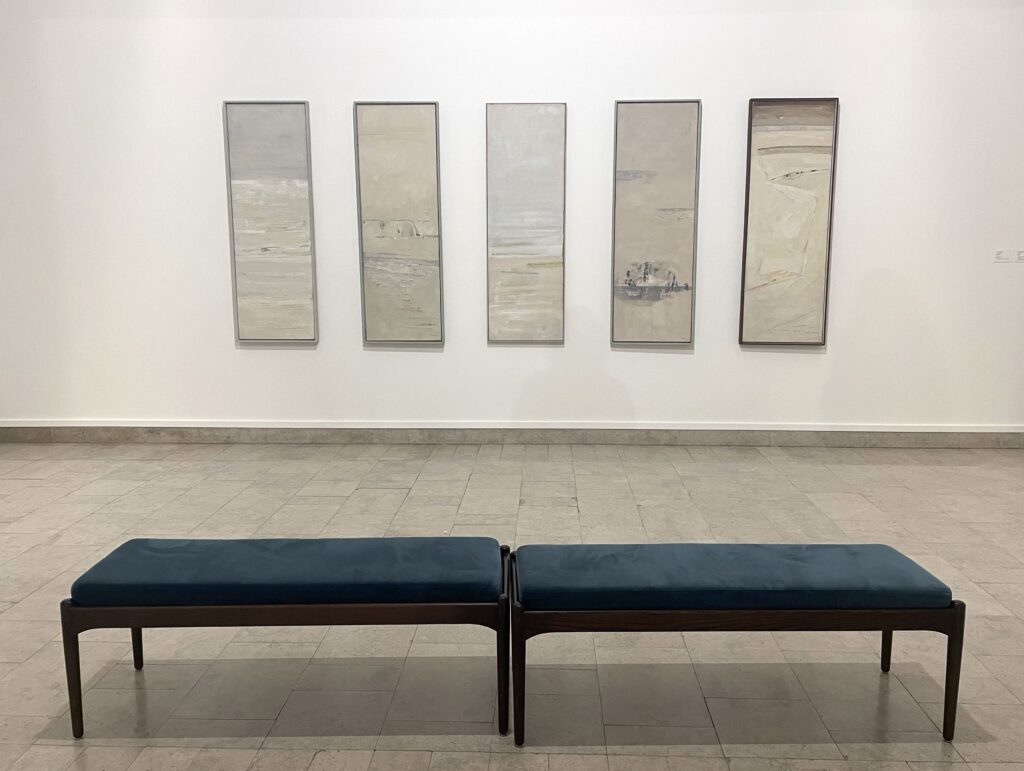
(Visit of Arpad Szenes – Vieira da Silva Museum)
The day ended with a visit to the Arpad Szenes and Vieira da Silva Museum, where we had a guided tour and enjoyed the new immersive exhibition, an exhibition overcoming the limits of space, also, an incredible digital experience built by Oskar&Gaspar, Ana Fatia and Guillaume Alatak (Art Direction), with an original soundtrack by Rodrigo Leão. Without a doubt, a visit to recommend to anyone!
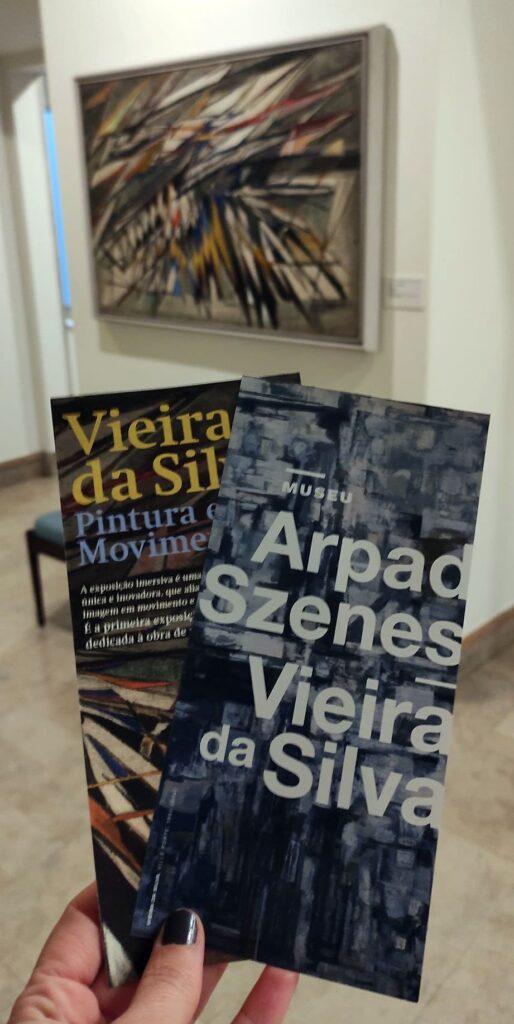
(Visit of Arpad Szenes – Vieira da Silva Museum)
In the evening we gathered for dinner at the restaurant, A Valenciana, having time to walk around the city and enjoy a Ginginha under the rain!
As we are half-way through of our COST Action, the pressure also increases to meet our deliverables! We are on a very good track, almost there! The in-person meetings are always a good occasion to motivate the team and increase our participation and involvement with the action. The Lisbon meeting was not an exception. It was with surprising enthusiasm that we started our third day: the transcribathons day!
Transcribathons are working sessions devoted to achieving WEMov COST Action’s deliverables. All four working groups held transcribathons in which members worked on their laptops, finding landmarks devoted to female migrants; primary data sources about female migration; milestones of collective female migration; and datasets on female migration. In the morning we had the one dedicated to “Primary sources” held by Tatjana Šarić and Katelin Parsons, followed by the “Milestones” held by Stellamarina Donato. After lunch, it was time for the transcribathon on “Datasets” held by Nina Drejerska and Selma Smajlović and finally on “Landmarks” held by Lívia Prosinger and Fiona Bakas.
A very dynamic, full-day session, culminating with a cocktail in the WEMov exhibition room.
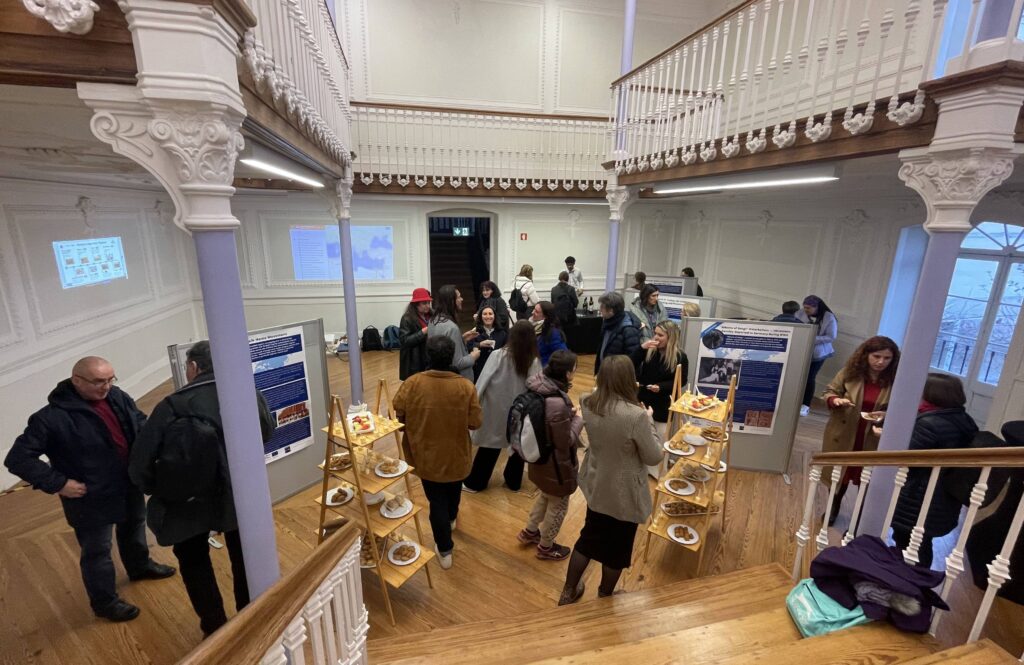
(Cocktail at the Library Hall of the Colégio Almada Negreiros, where the WEMov posters were exhibit)
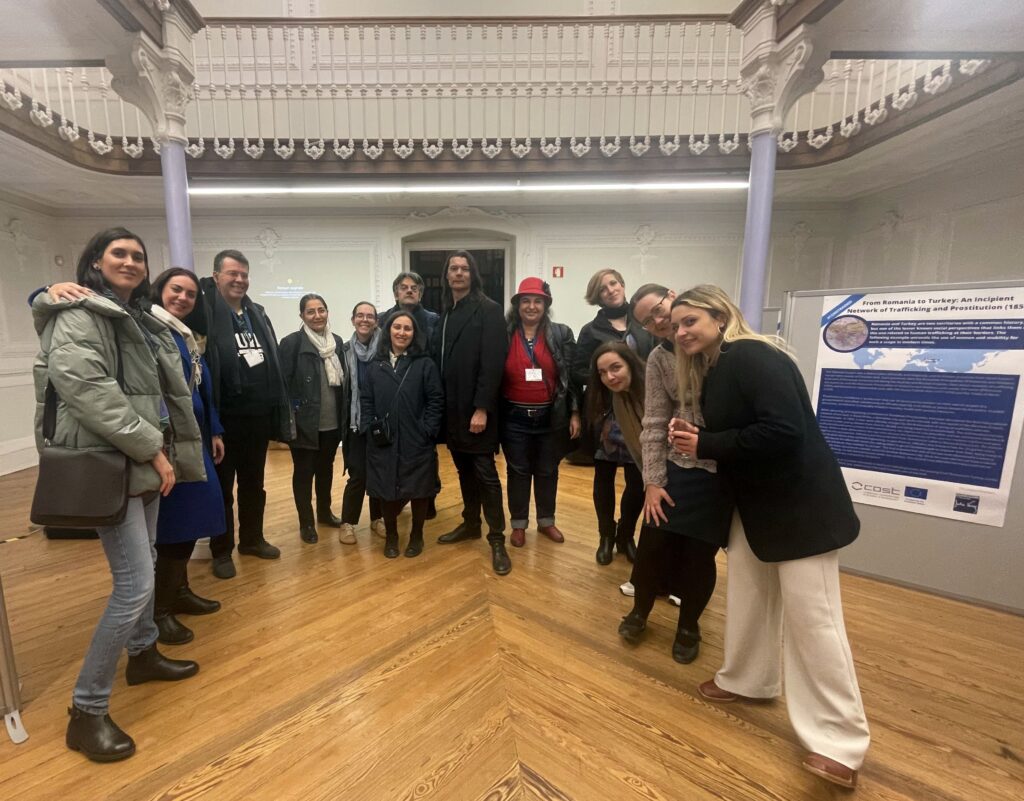
(Part of WEMov team relaxing after hard work)
Indeed, we have managed to boost dynamic participation with “transcribathons”, a way of describing them would be: coworking spacetimes where meaningful personal connections help us to feel more engaged and motivated, boosting our productivity; it’s a way to collectively learn how to collect and record the data we need and finally get down to work!
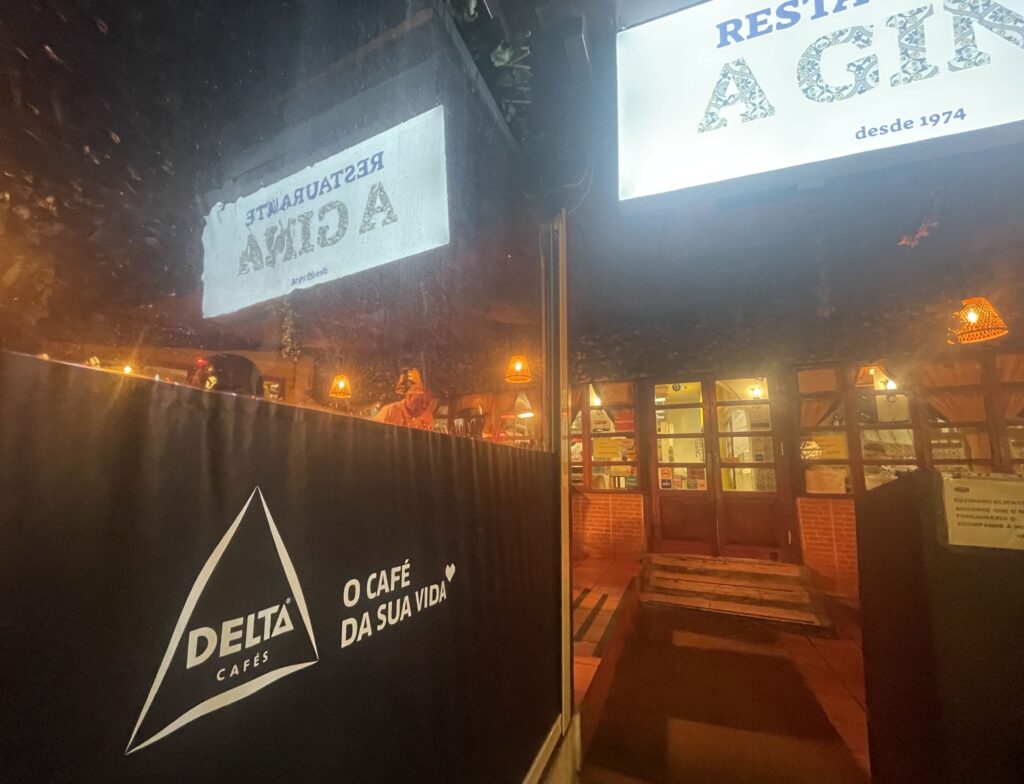
(Last conference dinner at Restaurant A Gina, Lisbon)
Our last dinner was in a well-known restaurant in Lisbon, A Gina in Parque Mayer. Pleasant and familiar environment, simple and homemade cuisine. A wonderful way to end our WEMov’s Annual Meeting in Lisbon!